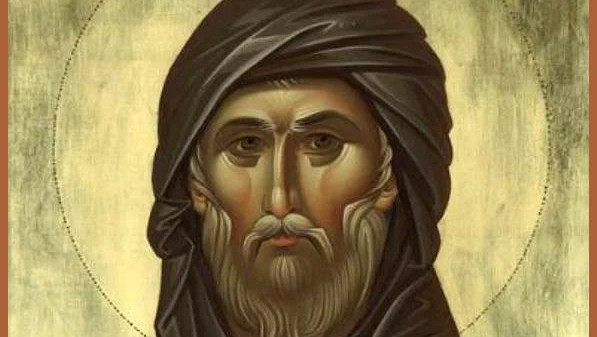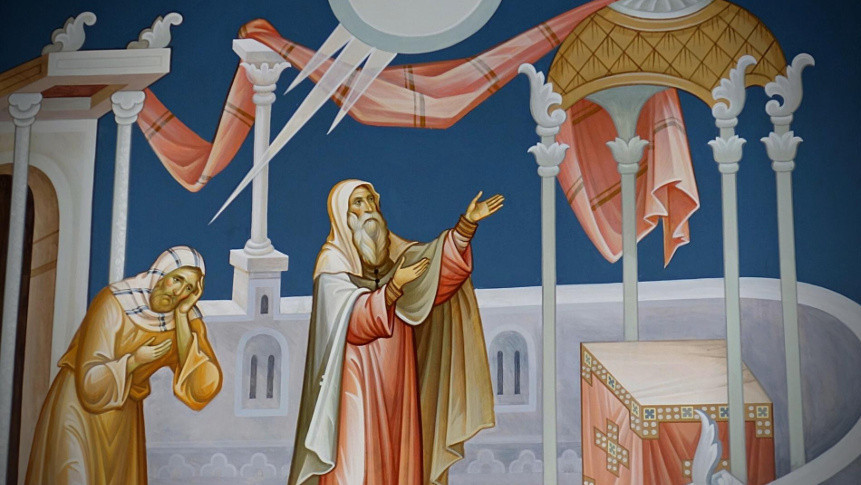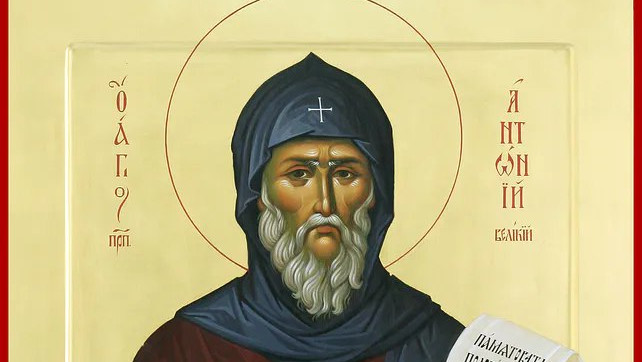Онлайн трансляция | 12 сентября
Название трансляции
- 12 сентября 2015 Название трансляции
- 12 сентября 2015 Название трансляции
- 12 сентября 2015 Название трансляции
- 12 сентября 2015 Название трансляции
- 12 сентября 2015 Название трансляции
- 12 сентября 2015 Название трансляции
- 12 сентября 2015 Название трансляции
- 12 сентября 2015 Название трансляции
Spirital treasure

Saint Seraphim (Amelin), Abbot of the Glinsk monastery (†1958)
 On October 18, 1958, Elder Seraphim, the abbot of the Glinsk Nativity of the Theotokos monastery, departed to the Lord.
On October 18, 1958, Elder Seraphim, the abbot of the Glinsk Nativity of the Theotokos monastery, departed to the Lord.
On May 8, 2008, at a regular meeting of the Holy Synod of the Ukrainian Orthodox Church, held in the Kyiv-Pechersk Lavra under the chairmanship of His Beatitude Volodymyr, Metropolitan of Kyiv and All Ukraine, Schema-Archimandrite Seraphim (Amelin), was canonised as a locally venerated saint.
The great elder, Schema-Archimandrite Seraphim, was a faithful follower of the wise abbots of the Glinsk Hermitage. It is thanks to him that the monastery flourished both spiritually and physically. Under his abbacy, the monastery became renowned for its holy elders—spiritual guides for monks and laypeople on their path to eternal salvation.
Father Seraphim (in the world, Simeon Dmitrievich Amelin) was born on July 21, 1874, into a peasant family in Solomino, Kursk Province. At the age of nineteen, he joined the Glinsk abbey. Even then, he was distinguished by a quiet temperament and gentle restraint. Deeply respecting the monastery’s abbot, Schema-Archimandrite Ioannikiy (Gomolka), Simeon attentively followed all his instructions. The abbot’s teaching that without keeping the mind, all spiritual efforts lose their meaning led the young ascetic to constantly watch over himself, weigh every word and action, and control his thoughts and feelings. He revealed all sinful movements of his soul to the elder. Openness, simplicity, and sincerity were qualities that Simeon had cultivated in himself since childhood in his parental home. Such vigilance gradually allowed him to achieve sobriety, which “is an essential component of true spiritual labour.”
On November 28, 1904, he was tonsured a monk with the name Seraphim. From that time, he especially zealously worked for his salvation.
In 1913, he was ordained a hierodeacon, and in 1917, a hieromonk. After that, he served as the sacristan and treasurer of the monastery.
During the revolution, he secretly took the great schema.
After the monastery was closed, Father Seraphim lived in the Kovenky, Sumy region village, where he worked as a carpenter and locksmith.
He returned to the Glinsk abbey in 1942 and worked tirelessly to restore the monastery and revive its spiritual traditions.
In 1943, already an elder of almost 70 years, he was appointed abbot of the Glinsk monastery.
Father Seraphim loved silence throughout his ascetic life, for he practised the Jesus Prayer, which is incompatible with verbosity. Through this inner activity, he attained spiritual stillness and angelic dispassion. Entirely dedicated to the care of the monastery and the salvation of the souls entrusted to him, he remained calm and focused despite the numerous and varied duties of the monastery’s abbot. There was never any bustle or irritation in him. Prudent and wise, despite the many concerns, he knew how to live as a recluse, remaining in mental and heartfelt prayer. This unceasing, fervent prayer invisibly protected the brotherhood from all the enemy’s wiles.
Through constant inner struggle, self-humiliation, sorrows, and various trials, Saint Seraphim received a great gift—love for God and his neighbours, which burned in his soul like the strongest fire. He treated the brotherhood as his own children. Out of love for them, he spoke very little and only about working on the mind and heart. He taught the brotherhood to be attentive, to live in piety, not to follow their own will, but to have complete obedience. He always gave instructions briefly, clearly, and precisely. His word contained high teaching and was exceptionally accurate, for Father Seraphim’s mind, enlightened by grace, clearly grasped the truths of God.
The elder had the gift of insight into the depths of human souls. Those who came to him felt that all their thoughts and feelings were open to him, and without words, they experienced a close spiritual connection with him. In communication with Father Seraphim, the mystery of silence was revealed. When the elder was sick in his last years and found it difficult to speak, many simply visited his cell without saying a word and left comforted and spiritually healed. Those who sought to see him during his illness assured the cell attendant that they would not disturb the elder with questions. They just wanted to be near the grace-filled elder for a little while.
Near him, all that was superfluous, vain, and superficial disappeared. A person became their true self and had the rare opportunity to see themselves from the outside, as they were. Everyone felt their sins and involuntarily came to sincere repentance. Then the elder, with gentleness, would say two or three words for the benefit of the soul, and these words, like a precious treasure, the person would keep all their life, thanking God for them.
In his cell, in prayer, Saint Seraphim knew everything that was happening in the monastery. His experienced eye saw all the spiritual needs of the brotherhood. For example, once, he called a young, zealous monk who had fasted so strictly that he became ill. It was the Apostles’ Fast, and Father Seraphim poured him a full glass of kefir (a kind of milk yoghurt) and commanded him to drink it. The monk drank it out of obedience, although he had never broken a fast in his life. Then Father Seraphim told him: “That’s right, don’t overdo it!” He wisely restrained young ascetics from excessive feats.
Humility was the main feature of his soul. It was evident in everything: in his appearance and actions. The elder even wore the great schema secretly: in the documents he signed for the monastery and his service record, he never indicated that he was a schema monk. With humility, he subdued everyone, even those who were dissatisfied. He made corrections gently, but when necessary, he could humble proud people with his word, thus showing them spiritual mercy.
In his cell, there was always a note on his desk with a saying from one of the Kyiv-Pechersk ascetics: “If you are a faster, poor, and sleepless, but do not endure reproaches, you will not see salvation.”
A particular trait of Father Seraphim’s spirituality was his peacemaking. This gift began to manifest itself in his youth, but it was revealed in its fullness during his abbacy. Father Seraphim brought the inner peace, the peace of Christ that reigned in his humble soul, to everyone around him, uniting people of all kinds with peace and love. Peace was the spiritual treasure that the elder blessed his spiritual children with. All complex matters became easy in his hands because the elder’s prayer would come to his aid. In all his endeavours, he entirely relied on the will of God, and thus, he was always calm, focused, content with everything, and thanked God for everything.
Father Seraphim helped restore the monastery not only through his spiritual renewal but also through external improvements.
The Lord glorified Saint Seraphim with visible miracles even during his lifetime. Many monks saw him walking around the monastery, but not everyone could see him.
Saint Seraphim, who spent fifteen years as abbot, revived eldership, and the ancient rule of the monastery adorned the monastery both spiritually and materially, creating all the conditions for helping pilgrims.
He departed to the Lord on Saturday, October 18, 1958, after a brief illness. The brotherhood testified that the elder’s face became radiant and shining before his death. After his passing, the elder appeared many times to the monks, continuing to instruct them.
In 1961, during the reburial of the elders, the incorrupt relics of Schema-Archimandrite Seraphim were discovered, and they now rest in the revived Glinsk monastery.
Редакция сайта www.lavra.ua
To signed up and receive Lavra’s emails and important news once a week.
You will be able to unsubscribe from emails at any time.




Spelling error report
The following text will be sent to our editors: